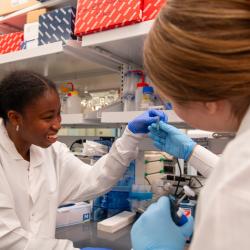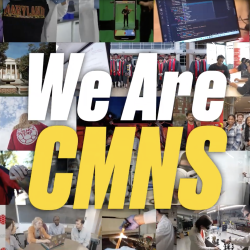UMD Researchers Awarded $1 Million Grant from NSF to Develop New Methods to Generate Single Photons for Quantum Research
Project could enable new advanced quantum research and technology and could yield new ways to connect electronic circuits and photonic devices
A team from the University of Maryland has been awarded $1 million by the National Science Foundation (NSF) to develop methods for generating single photons at room temperature in semiconducting carbon nanotubes. The project, which could result in new interfaces between electronic circuits and photonic devices, is part of a $31 million NSF effort to fund transformational quantum research that will enable the United States to lead a new quantum technology revolution.
The NSF funded the project, “Integrated Circuits of Single-Photon Sources from Organic Color-Centers,” as part of an initiative known as Research Advanced by Interdisciplinary Science and Engineering—Transformational Advances in Quantum Systems (RAISE-TAQS). The RAISE-TAQS effort is designed to encourage scientists to pursue exploratory, cutting-edge concepts in quantum research.
"Single-photon sources are a fundamental element for quantum information science and technology. However, it has been extremely difficult to prepare single photons with high efficiency,” said YuHuang Wang, a professor of chemistry and biochemistry at UMD and the principal investigator of the grant. “If successful, this work may further lead to a high-quality single-photon source that can be integrated directly into solid-state devices for photonic quantum information processing."
The award, which provides four years of funding, will leverage UMD’s expertise in quantum materials chemistry, theoretical physics, engineering and quantum information science. In addition to Wang, the grant also has two co-principal investigators: Joint Quantum Institute (JQI) Fellow and Physics Adjunct Professor Charles Clark and JQI Fellow and Electrical and Computer Engineering Professor Edo Waks. Waks also has an appointment in the Institute for Research in Electronics & Applied Physics (IREAP).
The project will also make use of ongoing collaborations with Los Alamos National Laboratory and IBM. Through these collaborations and within the participating units at UMD, the award will also enable opportunities for graduate training in quantum information science and technology.
For the project, Wang, Clark and Waks proposed a new way to generate single photons using crystallographic defects known as “color centers.” These imperfections occur naturally in some crystals. However, systems based on natural color centers can be unreliable and inefficient when used to generate single photons. To address these issues, the team proposed a method to engineer carbon nanotubes with a new family of color centers, discovered in the Wang lab, which can be chemically controlled with molecular-level precision.
In addition to providing a precise and reliable way to generate single photons, carbon nanotubes designed with color centers may also prove to be ideal desktop atomic physics laboratories, according to the researchers. Such applications could prove invaluable for studying the behavior of exotic “quasi-particles” such as excitons and trions.
The UMD award is one of 25 RAISE-TAQS projects, which will help lead to systems and proof-of-concept validations in quantum sensing, communication, computing and simulations. In addition to the RAISE-TAQS program, which accounts for $25 million of the total $31 million awarded for quantum research, the NSF also made an additional $6 million in grants via the related Research Advanced by Interdisciplinary Science and Engineering-Engineering Quantum Integrated Platforms for Quantum Communication (RAISE-EQuIP).
"The quantum revolution is about expanding the definition of what’s possible for the technology of tomorrow," said NSF Director France Córdova. “NSF-supported researchers are working to deepen our understanding of quantum mechanics and apply that knowledge to create world-changing applications. These new investments will position the U.S. to be a global leader in quantum research and development and help train the next generation of quantum researchers.”
###
About NSF’s Quantum Leap
NSF has been a driver of quantum technology research and quantum information science for decades. Of the 231 NSF-funded Nobel Laureates, 31 were honored for advancing quantum research. The research community is currently at a point of inflection on quantum science, thanks to recent advances in technology and instrumentation capabilities across disciplines. NSF is committed to supporting research that advances this important area of science, as well as new collaborative efforts. The Quantum Leap and Growing Convergence Research are two of NSF’s “10 Big Ideas for Future NSF Investments.”
Media Relations Contact: Matthew Wright, 301-405-9267, mewright@umd.edu
University of Maryland
College of Computer, Mathematical, and Natural Sciences
2300 Symons Hall
College Park, MD 20742
www.cmns.umd.edu
@UMDscience
About the College of Computer, Mathematical, and Natural Sciences
The College of Computer, Mathematical, and Natural Sciences at the University of Maryland educates more than 9,000 future scientific leaders in its undergraduate and graduate programs each year. The college's 10 departments and more than a dozen interdisciplinary research centers foster scientific discovery with annual sponsored research funding exceeding $175 million.






